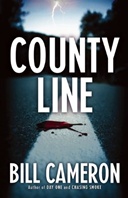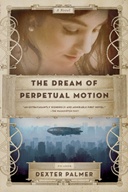“His bun-like face was not made bewildered by grief or fear. That was what he looked like.” — Philip Hensher, King of the Badgers
 |
County Line Bill Cameron This was a Free Friday Nookbook download from Barnes & Noble. Bill Cameron’s character is an ex-cop private eye, Skin Kadash, who lives and works in Portland, Oregon. Hip is the order of the day: Portland itself, the Pacific Northwest in general, and of course all the hipsters who live there. Coffee shops? This novel’s got ’em. If Skin had hopped on a cargo bike at some point, I wouldn’t have been surprised. This is good, workman-like private eye storytelling, and you won’t be disappointed. I myself was a little irritated with the way Cameron dribbled out the clues in this book, one small item at a time, right up to the closing pages. He did it by placing a secretive female at the center of the mystery, one who simply wouldn’t share. Personally, I found it unlikely that a real woman in trouble would go so far out of her way to hide essential, life-saving information from the men who are trying to help her, particularly since they are her current and former lovers. But apart from that bit of contrived unreality, I enjoyed the read. Should another Skin Kadash novel throw itself my way, I’ll read it. With a cup of Starbucks in my hand. |
 |
King of the Badgers Philip Hensher Here’s what I had to say about an earlier Philip Henscher novel, The Northern Clemency: “One of the more engaging novels I’ve read recently, what appears at first glance to be a gentle, modest story about middle-class British family life reveals itself to be a multi-generational saga spanning two decades; in short, a novel about everything that’s important, told with penetrating insight, brutal honesty, and wry humor.” King of the Badgers is anything but gentle. It stretches the concept of “family life” to its limits. The story unfolds over a span of months rather than decades. It’s not about anything terribly important. But as in The Northern Clemency, Henscher’s penetrating insight, brutal honesty, and wry humor infuse every page. Using the abduction of an eight-year-old girl from a nearby housing project as the unifying event, Hensher takes us behind the closed doors of families in the fictional Devon town of Hanmouth, where we meet the solidly respectable, the financially desperate, the social climbers, the community trouble-makers, the bohemian rebels, and the gay couple who host orgies. Among them are the good-hearted, the true and false friends, the schemers, the men and women with secret lives. Lurking around the edges are thieves, grifters … and worse. Hensher mixes narrative styles, going from third-person observer to omniscient narrator, but he does it so deftly I might not have even noticed (if he hadn’t titled one of his chapters “The Omniscient Narrator Speaks,” that is). King of the Badgers is a blast. Reading it is a giddy experience. I got caught up in the tabloid excitement of the little girl’s abduction and the perfidy of her trailer-trash family (and the far more sinister events that follow), I couldn’t tear myself away from the lives and secrets of the good citizens of Hanmouth. I was surprised that I was not at all put off by the flamboyantly homosexual couple and their lurid orgy. I laughed out loud when Spencer, to the horror of all, put his hand down Mauro’s pants at Catherine and Alec’s housewarming party. I was surprised when my heart warmed to Hettie, an awkward teenaged girl whose dolls have secret names like Child Pornography and Slightly Jewish, who becomes the moral center of the story. I was happy when things began to look up for Kenyon and Miranda. I won’t forget any of these people … they became, for a brief while, part of my own life. Such is the richness of Philip Henscher’s writing. I love it. |
 |
Blood Safari Deon Meyer This was another free Nookbook download from Barnes & Noble. I was attracted to the idea of reading a mystery/thriller set in South Africa and written by a South African … and not only a South African, but a Boer, a Dutch Afrikaner … a country and a people I know next to nothing about. It’s a more than decent thriller, well written and plotted. The story carried me from page to page, and that’s what you want in a thriller. The plot centers around a mysterious ecological activist who is murdering poachers on big game reserves upcountry. When a brief item about him appears on the nightly TV news in Johannesburg, a woman recognizes her long-lost brother, whom everyone thought was dead. She hires a bodyguard from a private security service and sets off in pursuit, awakening the enmity of shadowy forces who try repeatedly to kill her and her bodyguard. The story is told from the POV of the bodyguard, a man with plenty of secrets in his own past. When I first read Stieg Larsson’s The Girl with the Dragon Tattoo, I had a stong “Wow, this is different” reaction to the Swedish settings, characters, and outlook on life. I had hoped for something like that with this, and I did get a whiff of it, but nowhere near as much as with Larsson. I don’t think that’s any fault of the author, Deon Meyer … modern-day Afrikaners and South Africa seem less alien, somehow, then Swedes and Sweden. Like I said, a more than decent thriller. If you like these kinds of stories, you’ll enjoy Blood Safari. |
 |
Reamde Neal Stephenson I’ve read two previous Neal Stephenson novels, Anathem and Snow Crash. The first is a sci-fi epic, long on theorizing and esoteric concepts but with enough space opera to hold your interest; the second, another sci-fi epic (and one of the early cyberpunk novels), puts the action in the forefront while relegating the esoterica to the background. Reamde dispenses with sci-fi and esoterica altogether. It’s a conventional action thriller, quite well done and hard to put down despite its 1,000-page length. A major character, Richard, is a game developer whose MMORPG (massively multiplayer online role-playing game), T’Rain, is a worldwide hit, played obsessively by almost every male (and many females) with access to the internet. Stephenson explores the concepts and strategies behind MMORPGs, including the cheating, virtual treasure selling, and creation of shortcuts for sale by third-world players, things that actually go on in the world of multiplayer games today. Through an incredible set of coincidences, Richard’s niece Zula winds up in the hands of Russian criminals flying to China to track down and kill an uber-hacker who is making trouble in both the real and virtual worlds. One hair-raising adventure after another ensues, until eventually Richard’s niece winds up in the hands of an international terrorist determined to sneak into the United States in order to wreak havoc. By this time, about 400 pages into the novel, a large network of people are working to find and rescue Zula … and not incidentally stop the terrorist before he can do any more harm. Some are working inside the virtual world of T’Rain, but most are out there in the real world, shooting and being shot at. The trail of bodies and destroyed buildings, cars, boats, and airplanes is by this point in the novel already impressive. And then it starts to get intense. The best part of the novel is in the middle, when the various actors are in China and mostly together, either with or somewhere near Zula. At that point in the story the number of actors and scope of events are comprehensible. After China, however, when the action shifts to the Philippines, Canada, and the United States, the number of characters and sub-plots increases dramatically. The sort-of-cohesive group that closely orbited Zula in China now splits up into small groups of two or three characters each. The groups wind up in different locations, working toward different goals, one group knowing this but not that, another group knowing that but not this, etc. Neal Stephenson’s narrative gifts are sufficient to keep you from becoming too confused, but as you get to the last 200 pages and the groups and sub-plots begin to converge again, zeroing in on the terrorist (and Zula, still his hostage), the level of action and number of possible consequences shoot through the roof and climb toward the stratosphere. The climactic end of the novel is almost unbearable to read, a seemingly endless series of cliff-hangers. Things come at you so fast, and so seemingly out of the blue, that you begin to think the damn novel can’t possibly end. Stephenson isn’t content with criminals, hackers, terrorists, former Soviet Spetsnaz troops, highly armed (and remarkably lucky) amateurs, and stray MI6 agents; oh no, now he throws in the FBI, the CIA, the Mounties, a pack of redneck Idaho militia types, even a man-eating mountain lion … you arrive at the finish line (which mercifully does exist after all) in a fine lather, gasping for breath. The plot, contrived as it is, is almost too much. It’s not of this world. By “not of this world” I don’t mean that Stephenson invokes sci-fi technology or the supernatural, I just mean that none of these far-fetched coincidences would ever happen in the real world. His novel is really a huge potboiler, something to be read for its entertainment value only. And it is entertaining, entertaining as hell actually … I could wish it were more grounded in reality, but I have to admit I had a hell of a good time reading it. |
 |
Ready Player One Ernest Cline Ready Player One is not at all my sort of thing, but I must say the novel kept my interest throughout. It’s sort of a wish-fulfillment story for gamers, computer freaks, and other such shut-ins. In the near future, in a depleted and impoverished world, a gazillionaire Steve Jobs-like figure who has invented a vastly improved internet and user interface called OASIS dies and leaves a recorded announcement: whoever can find my three-level game and then solve it will inherit all my money. Crackers, hackers, and geeks the world over plug into OASIS and get to work. One teenager, after five years, finally cracks level one, followed quickly by a few others, including an evil corporation determined to take over OASIS and ruin it by charging everyone for using it. The good geeks become friends and wind up working together, the evil corporate geeks become progressively more villainous, and the reader is inexorably pulled toward the grand climax, the solving and winning of the game. The gazillionaire was a mega-geek himself, of course, addicted to 1980s computer games and pop culture (television, music, books, and movies), and the clues as well as the game itself involve massive doses of 1980s trivia. The constant insertion of geek-culture cultural references, as well as the engaging good-guy geek characters, pull you along. Is it a silly story? Of course it is. But it’s a fun read, even if you are not part of this culture. I breezed through this nearly 400-page novel in a couple of days, enjoying myself the whole time. |
 |
The Dream of Perpetual Motion Dexter Palmer A debut steampunk novel, borrowing heavily from Shakespeare’s The Tempest, set in an alternate 20th century city, Xeroville, where technology extends to mechanical card-reading computers, clockwork robots, zeppelins, radio, black & white movies, and flying cars. The sound of operating machinery is a constant backdrop. Prospero’s island is the 150-story onyx Taligent Tower, where the reclusive, Thomas Edison-like inventor tries in vain to restore his now-adult daughter Miranda to a state of virginal childhood. Caliban makes a memorable appearance, pecking away with mismatched vivisected fingers on a cast iron typewriter connected by a thick cable to his own brain. Oh yeah, the visuals are stunning. The hero is the dislikable Harold Winslow, a failed writer who, back when Miranda really was a 10-year-old virgin (and rather dislikable herself), was her only friend. Harold, now imprisoned aboard a high-altitude zeppelin along with the frozen corpse of Prospero Taligent, the disembodied personality and voice of Miranda, and a crew of mute mechanical men, tells the story of how this all came to be in a series of reminiscences going back to his own infancy. The Dream of Perpetual Motion is an ambitious and portentous-seeming novel, but on reflection I wonder if it really had all that much to say. Literary allusions, fascinating visions of an alternate world, and interesting plot twists aside, at the end I felt I was clutching so much scented air. A good read, but curiously flat. That said, I will certainly keep an eye out for Dexter Palmer’s future writing. |